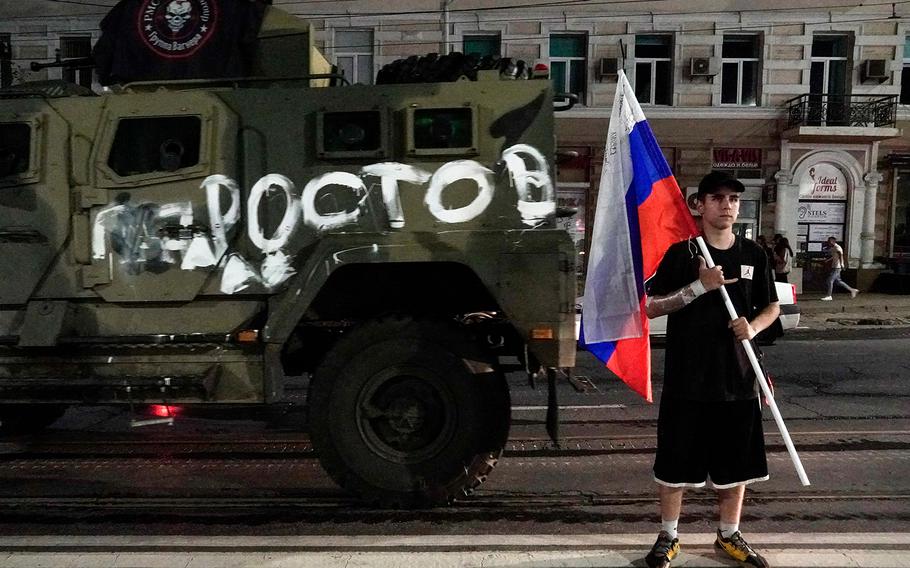
A man holds the Russian national flag in front of a Wagner group military vehicle with a sign reading “Rostov” in Rostov-on-Don, June 24, 2023. Rebel mercenary leader Yevgeny Prigozhin who sent his fighters to topple the military leaders in Moscow will leave for Belarus and a criminal case against him will be dropped as part of a deal to avoid “bloodshed,” the Kremlin said on June 24. (Stringer, AFP via Getty Images/TNS)
(Tribune News Service) — Russian President Vladimir Putin is damaged goods. He may have survived the mutiny by Yevgeny Prigozhin and his Wagner Group of mercenaries. In reacting as he did, though, Putin not only made himself even weaker, but planted the idea of his impotence in the minds of Russians and the world.
Of course Putin had to show himself and say something to the nation as Prigozhin’s mercenaries seized the southern Russian city of Rostov and started driving north toward Moscow. But what exactly? The mutineers were “betraying” the nation in its fight against “neo-Nazis” and the West, Putin asserted limply. That much was expected. The mistakes came next.
The first one was comparing Prigozhin’s coup attempt to the mutiny of Russian soldiers in early 1917. That planted three parallels in Russian minds that’ll be hard to erase. First, there’s a weak and unpopular Tsar — Nicholas II, later executed with his family, then, Putin today. Second, there’s a war going on that Russia is losing — World War I then, Russia’s invasion of Ukraine now. Third, there’ll soon be revolution and civil war, so start thinking about which side to be on.
The second mistake was even graver. Putin promised his response “will be harsh.” The mutineers will “inevitably be punished,” he said. The traitors “will be held to account.”
With this macho talk he was channeling his old strongman persona, forgetting to pause and think whether he still had the power to make good on his bluster. Apparently, it occurred to him only later that he didn’t, for he decided to take a deal brokered by Belarusian President Alexander Lukashenko instead. It lets Prigozhin, and presumably some of his mercenaries, move to Belarus, while Russia formally drops all charges against him. Harsh punishment looks different.
The cognitive dissonance of Lukashenko making the phone call made Putin’s climbdown even more humiliating. In recent years, it’s been the dictator in Moscow who’s had to rescue the one in Minsk from the revolutionary energies of their subjects. In their meetings, Putin was always careful to display a silverback body language that made the physically towering Lukashenko look like a minion of the Kremlin. Now the roles have reversed.
How long can either of these strongmen — or, rather, weakmen — still have in power?
The reality — as everybody knows not only in Moscow and St. Petersburg, but also in Beijing, Kyiv, Washington and everywhere else — is that while shooting may have been averted on Saturday, absolutely nothing is resolved. Prigozhin, who runs a private army that kills and maims for profit, from Africa to Syria and Ukraine, isn’t the type to retire and play bingo. He’ll be up to something before long. After all, he’s a meme hog on social media already.
It’s in that role that Prigozhin threw another Molotov cocktail into Putin’s story. In the barrage of Telegram videos he posted in the run-up to his seizure of Rostov, the Wagner boss casually and profanely wrecked the entire propaganda narrative Putin has been selling to his population. In that topsy-turvy reality, remember, Russia is not the aggressor but the victim, defending itself against Nazi Satanists in Ukraine and their NATO puppet masters in the West. In fact, Prigozhin said, that storyline is total bunk, and the “so-called special operation was launched for completely different reasons,” mainly pillaging. Since then, he added, it’s turned into a “monstrous shame show” run by “mentally ill scum.”
This insight hardly comes as a shock to any lucid person, in Russia or anywhere. But it’s notable hearing it from somebody who until recently was billed as Russia’s most competent (or only competent) warlord in that said shame show. Kremlin propaganda will never be the same again. In that sense, Prigozhin is like Toto pulling back the curtain to reveal that the fearsome Wizard of Oz is a humbug.
In all of these ways, Putin continues, 16 months after his unprovoked invasion of Ukraine, to be the opposite of his Ukrainian counterpart and namesake, Volodymyr Zelenskyy. Where Putin spreads lies, Zelenskyy hews to the truth wherever possible (this is war, after all). Where the man in Moscow is at heart a coward, the one in Kyiv has found his inner hero.
“I need ammunition, not a ride,” Zelenskyy countered when the Americans, in the early hours of the Russian attack against him, offered to spirit him out of the country. As Prigozhin’s warriors pointed their guns at Moscow, Twitter turned that meme on its head and attributed it to Putin: “I need a ride, not ammunition.” Whether by ride or other conveyance, this wannabe Tsar appears a big step closer to retirement.
This column does not necessarily reflect the opinion of the editorial board or Bloomberg LP and its owners.
Andreas Kluth is a Bloomberg Opinion columnist covering European politics. A former editor in chief of Handelsblatt Global and a writer for the Economist, he is author of “Hannibal and Me.”
©2023 Bloomberg L.P.
Visit bloomberg.com/opinion.
Distributed by Tribune Content Agency, LLC.